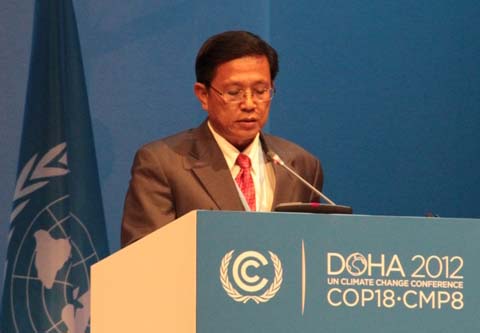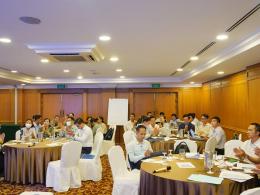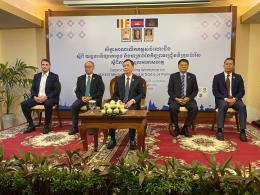 As a party to the UN Framework Convention on Climate Change (UNFCCC), Cambodia fully supports the efforts to address climate change based on the key principles of the UNFCCC.
As a party to the UN Framework Convention on Climate Change (UNFCCC), Cambodia fully supports the efforts to address climate change based on the key principles of the UNFCCC.
Furthermore, the Cambodia negotiating positions have been proposed in line with those of the Least Developed Country (LDC) group and the G77+China group.
A.General positions
- Cambodia calls for all parties that all actions or measures related to climate change must be in full conformity with the principles and provisions of the Convention, in particular those of equity, historical responsibility, common but differentiated responsibilities and respective capabilities and ensuring sustainable development of developing countries;
- Cambodia recognizes that the increasing of temperature will have catastrophic impacts for Least Developed Countries due to their high vulnerability to the impacts of climate change in particular low adaptive capacity;
- Recognizes that achieving sustainable development and the Millennium Development Goals (MDGs), poverty reduction are the priority for the Least developed Countries Group;
- Recall that the paragraph 9 of the Article 4 of the UNFCCC recognizes the Least Developed Countries as a group having specific needs and special situations concerning funding and transfer of technology.
B. Adaptation and its associated means of implementation
- Cambodia supports to the commitmenton the implementation of adaptation and mitigation actions, whichshould be equally treated for the future climate regime;
- Cambodia welcomes the Adaptation Framework established in Cancun and its provisions for LDCs process to formulate and implement the National Adaptation Plans (NAPs) and work programmes on Loss and Damage based on each country priorities;
- Support the Adaptation Committee established under the authority of the Conference of Parties (COP) of the convention and call for its operationalization as soon as possible in the near future.Cambodia callsfor providing funds for theimplementation of adaptation actionsshould cover full cost without incremental cost or co-financing;
- Support to the establishment ofadaptation mechanism for LDCs in the Green Climate Fund;
- Support to the establishment ofInternational Adaptation Centre and Regional Adaptation Centers and should be provided supports and inputs to better understanding the issues related to impacts, vulnerabilities of climate change.
C. Mitigation and its associated means of implementation
- Cambodia welcomes to the establishment of Ad Hoc Working Group on Durban Platform (ADP), which will work and prepare a legal binding outcomes of the negotiation processes that should be finalized by 2015, and will enter into force for implementation from 2020;
- Cambodia supports the Kyoto Protocol second commitment period but for the CDM implementation procedures should be simplified and explored to enable LDCsfully participate in CDM projects as well as supports to the establishment of new market mechanism under the UNFCCC;
- All Annex I Parties must take legally binding additional mitigation commitments or actions taking into account the Principles of the Convention to reduce their GHG emission by at least 45% below 1990 levels by 2020 and at least 95% below 1990 levels by 2050 in order to ensure GHG and aerosol concentration below 350 ppm CO2 equivalent and temperature rise below 1.5C;
- Support to the implementation of Nationally Appropriate Mitigation Action in developing countries (NAMAs), but these GHGs mitigation activities must be measurable, reportable and verifiable (MRV) manner. The implement of NAMAs should be voluntary and based on country driven priorities and will be supported from developed countries on technology, capacity building and finance for ensuring environmental benefits according to all mechanisms adopted by the convention.Call for Non-annex I Parties to show their willingness to reduceGHGs emissions voluntarily in order to contribute to global goal of emission reduction;
- Cambodia recognizesthat mechanisms on Reducing Emissions from Forest Degradation and Deforestation in developing countries and the role of conservation, sustainable management of forests and enhancement of forest carbon stocks (REDD+) has been delayed in implementation although developed and developing countries are ready to move forward. Cambodia wants to see the progress of the establishment mechanismsand decisions in discussionsin particular financial analysis and actions for implementation REDD+ in the future.
D. Financial Resources
- Cambodia encourage for developed countries to commit and increase their financial supports to climate change vulnerable countries especially LDCs;
- Cambodia encourage for developed countries to provide financing supports to developing countries annually US$100bm by 2020 as indicated in the Copenhagen Accord;
- Support the provision of new, additional and predictable finance from public sources by Annex 1 countries. It should be fast track, direct and easy access of public funds following provisions of the convention particularly Article 4. The private sector through market-based mechanisms should complement or leverage the public finance. Co-financing should not be an obstacle/barrier or conditional for developing countries in receiving those funds or financings;
- Fund’s contributions from individual developed country and other developed countryparties in the Annex II,shall be taken into account on the historical responsibilities and principles of the UNFCCC convention;
- The scaled up commitments for climate change actions should be at least 1.5 % of gross domestic product (GDP) per annum of individual developed country parties in the Annex II and other developed country parties not included in Annex II, of which 60% of this funds should be used to address adaptation issues and 40% for mitigation activities. In addition, 70% of the adaptation funds should be allocated to LDCs in line with provisions of Article 4.9 of the UNFCCC convention;
- Cambodia welcomes the establishment of the Green Climate Fund (GCF) and the transitional and standing committees and call for the urgent of their operation.
E. Development and Transfer of Technology
- Cambodia supports the Technology Needs Assessment,particularly the urgent need for development and transfer of technologies for adaptation in all developing country parties, in particularSmall Island Developing States (SIDS) and Least Developed Countries (LDCs). In addition, the Technology Action Plan should be prepared and implemented with support from developed countries. Technology transfer should be country driven and based on the principal of the Learning by Doing;
- Cambodia welcomesthe establishment of Cancun International Technology Mechanism which the operation under the authority of the UNFCCC convention;
- Cambodia supports the establishment of the Technology Executive Committee (TEC) and the Climate Technology Centers and Networks (CTCN);
- Support the provision of necessary and immediate financial and capacity building support to develop national technology action plans including Climate Technology Centre and Networks;
- Support specific and urgent measures to remove barriers arising from intellectual property rights in Developing Countries and LDCs on environmental friendly technologies.
F. Capacity building
- Cambodia supports enhanced actions on capacity-building to improve enhancement of the capacities and capabilities of developing countries. The capacity building should be a continuous process, be country-driven, full participatory and integral process to strengthen actions on all elements of the Bali Action Plan;
- Capacity building should be supported developing country Parties in developing and implementing capacity building projects and strengthen subnational, national and regional capacities to address the climate change;
- Support action for empowering and strengthening relevant institutions, including focal points institution and national coordinating organizations;
- Support the need for capacity building which canbe measured through the use of agreed and effective performance indicators and all parties should report on progress made in enhancing capacity to address climate change in their national communication.
The official Khmer document can be obtained here: Cambodian Positions for the COP18 Kh



